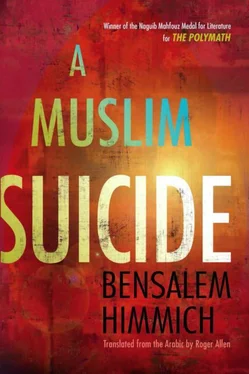Abu Dharr al-Ghifari (d. c. 652): An early convert to Islam, highly regarded in the Shiite community because of his opposition to the caliphate of `Uthman ibn `Allan, the third caliph.
Abu al-Faraj al-Isfahani (897–957): The compiler of one of the greatest collections of Arabic poetry and literary biography, Kitab al-aghani (The Book of Songs), long since acknowledged as the major source for information and anecdote about poets, poetry, and performance in the classical period of Arabic poetry.
Abu Madyan: see Shu`ayb Abu Madyan.
Abu al-Hasan al-Shushtari (1212–1269): The renowned Sufi poet and singer, who became a disciple of Ibn Sabin and who is to play a major role in the narrative of this novel.
Abu Muhammad `Abdallah (d. 1227): The Almohad ruler who succeeded his assassinated brother, `Abd al-Wahid, in 1223. His brothers conspired against him during his reign, and he was eventually put to death by drowning in 1227.
Abu Nu'aym al-Isfahani (d. 1038): A prominent Sufi master and transmitter of prophetic hadith.
Abu Nuwas (756–814): One of Arabic's most colorful poets, whose poetic persona-amplified in the tales of A Thousand and One Nights-is difficult to separate from his actual life. He was famous for his wine poems and his ghazal, addressed to lovers of both genders. His collected poetry (diwan) may be the first to have been organized according to subgenres rather than other more traditional methods (such as end-rhyme).
Abu Qubays: A mountain running north to northwest outside Mecca.
Abu Talib: The uncle of the Prophet Muhammad and father of Ali.
Abu Tammam (d. 845): one of Arabic's most renowned poets, remembered for the originality and complexity of his poetic imagery and the adverse reactions of the critical community to his works.
Abu al-Walid al-Azraqi (ninth century): The author of a description of Mecca and its environs, entitled Akhbar Makka.
Al-A`mash (680–765): Otherwise known as Sulayman ibn Mihran, a collector of hadith and a specialist in the recitation of the text of the Qur'an.
A'isha: Daughter of Abu Bakr (who later became the first caliph of Islam), and wife of the Prophet Muhammad.
Alexander legends: Stories concerning the life and exploits of Alexander the Great, the king of Macedon, began to appear in Greek from the third century. The story of "Dhu al-qarnayn" (two-horned one), linked to an episode in the romance, appears in the Qur'an (Sura 18, The Cave).
Alfonso VI (1040?-1109): King of Leon and later of Castile, both a learned man and a vigorous defender of Christian Spain. While an advocate of relations with the Muslim rulers of Spain, he opposed the invading Almoravids (q.v.) and was defeated by them in 1086.
`Ali ibn Abi Talib (c. 599–661): The cousin and son-in-law of the Prophet Muhammad, caliph between 656 and 661, and, following his death, the foundation figure of Shiite Islam (originally "Shi'at Ali; Ali's party).
Ali al-Said: One of the Almohad rulers of Morocco (and Spain) who ruled from 1242 until his death in 1248.
Alif-lam-mim: These are some of the so-called "mystical letters" found in the text of the Qur'an. Several suras of the Qur'an begin with this and other combinations of letters of the alphabet, and there are a variety of interpretations as to their significance. James Bellamy has suggested, for example, that they constitute abbreviations of the "bismillah" (in the name of God) formula.
Al-Mansur, Abu Yusuf (d. 1199): The Almohad ruler whose reign marks the climax of Almohad power. He conducted successful campaigns against the Christians in Spain and his rivals in Morocco before retiring to Morocco and bequeathing authority to his son, Muhammad.
Almohads: In Arabic, Al-Muwahhidun" (those who support the unity of God), the Amazigh dynasty that gained control over much of North Africa and Spain in the twelfth century, making Seville their capital from 1170 onward. Their period of power came to an end with the Battle of al-'Iqab (q.v.).
Almoravids: In Arabic, Al-Murabitun;' a term derived from the word "ribat" (monastery, fortress). They were an Amazigh dynasty that, having brought much of northwest Africa under their control in the eleventh century, were invited to assist the last of the so-called taifa kingdoms, of Seville, in resisting the Christian armies of the north. In 1091 the last of those rulers, Al-Mu'tamid of Seville, was deposed, and the Almoravids ruled Spain from their capital in Marrakesh until they too were ousted by the Almohads (q.v.) in 1147.
Antimony: Also known as "kohl" in Arabic, in medieval times it was believed to have medicinal properties for the eye.
Aristotle: Among the Greek philosopher's works, the following are specifically identified in Himmich's text: the Categories is a title given by his followers to one of his major studies on logic; On Generation and Corruption is a text concerning the causes for the generation and disappearance of phenomena based on empirical observation; Meteorology is a text discussing the environment and climate.
`Ayn Jalut: see Battle of Ayn Jalut.
Ayyubid: The Bani Ayyub, a dynasty of Kurdish origins that ruled over Egypt and much of Syria in the twelfth and thirteenth centuries.
Azhar Mosque: In Cairo, built originally by the Shiite Fatimids in the tenth century CE, it subsequently became a major center of Sunni learning.
Al-Azraqi: see Abu al-Walid al-Azraqi.
Badis: A thriving port on the North African coast.
Banu Ahmar: The rulers of Granada until its fall in 1492, who gave their name to the city's most famous monument, the Al-Hamra'-"the red" (Alhambra).
Banu Hud: One of the so-called taifa kingdoms that ruled the Zaragoza region of Spain between 1039 and 1110. In opposing the Almoravids, they sought the aid of the kingdom of Castile and were forced to pay tribute.
Banu Nasr: see Nasrids.
Battle of al-'Iqab (Las Navas de Tolosa, July 1212): A turning point in the history of Islamic Spain, in that the Christian forces of Castile, Navarre, and Aragon united under the command of Alfonso VIII and inflicted a crushing defeat on the Muslim Almohad army.
Battle of `Ayn Jalut (Goliath's Spring): The crucial battle in September 1260 in which the Mamluks of Egypt, under the command of Al-Zahir Baybars, defeated the Mongol armies.
Baybars: see Al-Zahir Rukn al-din Baybars.
Bishr al-Hafi (767–840): The "barefoot," one of the earliest of Sufi masters.
Bismillah: The formulaic utterance "In the name of God, the Compassionate, the Merciful."
Al-Bistami, Abu Yazid (804–874): An early Sufi master who emphasized the ecstatic nature of the process of cancelling a concern with this world as a means of communication with the transcendent.
Al-Bitruji (d. c. 1204): A major Arab astronomer who composed Kitab al-Hay'a (Book of the Planetary System).
Brethren of Purity (Ikhwan al-safa'): A group of esoteric philosophers who gathered in southern Iraq in the tenth century and produced a series of epistles (rasa'il) on a variety of topics.
Al-Buni, Ahmad ibn `Ali (d. 1225): A Sufi writer who concentrated on the mystical value of individual letters in the Arabic alphabet.
Buraq: The name of the miraculous horse on whom the Prophet Muhammad is said to have left Mecca and gone on his "night-journey" into the heavens. One of the suras in the Qur'an (Al-Isra') is named for this event.
Elephant Lake (Birkat al-Fil): A lake in the middle of Cairo in premodern times, around the shores of which notables constructed their mansions.
Al-Farabi (d. c. 950): One of Islam's greatest polymaths. Of Persian origin, he wrote works on philosophy and music among many other topics. Among his many works on philosophy is the one mentioned in this novel, The Collection of Opinions of the Two Sages, Plato and Aristotle.
Fernando [Ferdinand] (III) of Castile (1199–1252): From 1217 king of Castile and later Leon (1230), he was responsible for the Christian capture of many prominent Andalusian cities, including Cordoba (1236) and Seville (1248).
Читать дальше












